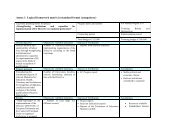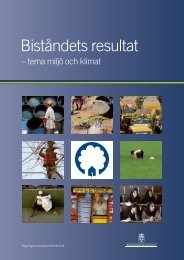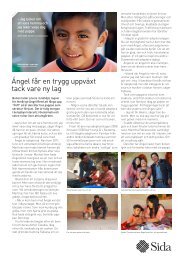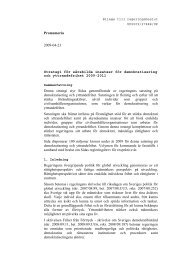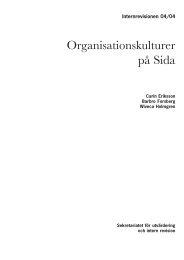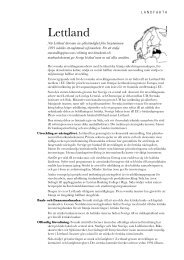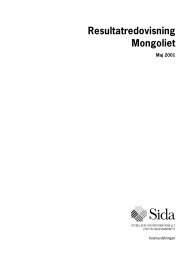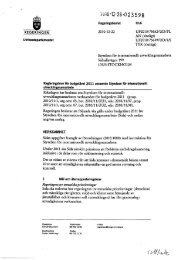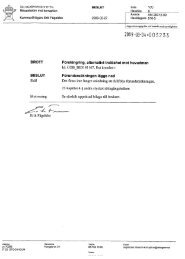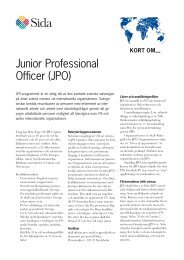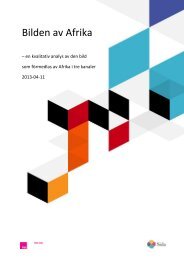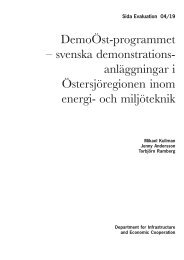Sida Procurement Guidelines (SPG)
Sida Procurement Guidelines (SPG)
Sida Procurement Guidelines (SPG)
Create successful ePaper yourself
Turn your PDF publications into a flip-book with our unique Google optimized e-Paper software.
JUNE 2004<br />
<strong>Sida</strong> <strong>Procurement</strong><br />
<strong>Guidelines</strong> (<strong>SPG</strong>)
Table of Contents<br />
1. Introduction ............................................................................. 3<br />
1.1 Preamble........................................................................................ 3<br />
1.2 The Purpose .................................................................................. 3<br />
1.3 Definitions and Terminology ........................................................ 4<br />
1.4 Applicability of the <strong>SPG</strong> ............................................................... 4<br />
1.5 When <strong>Sida</strong> applies the <strong>SPG</strong> .......................................................... 5<br />
2. Principles And Consideration ..................................................... 6<br />
2.1 Basic Principles .............................................................................. 6<br />
2.2 Eligibility ....................................................................................... 6<br />
2.3 Co-operation Partner Responsibilities .......................................... 6<br />
2.4 <strong>Sida</strong> Responsibilities ...................................................................... 7<br />
2.5 Ethics in <strong>Procurement</strong> ................................................................... 7<br />
2.6 Conflict of Interest ........................................................................ 8<br />
2.7 <strong>Procurement</strong> Secrecy..................................................................... 8<br />
2.8 Green <strong>Procurement</strong> – Environmental Considerations ................ 8<br />
2.9 Social Considerations .................................................................... 9<br />
3. <strong>Procurement</strong> Methods and Common<br />
Rules Applicable to all Contracts ............................................. 10<br />
3.1 <strong>Procurement</strong> Planning................................................................. 10<br />
I. <strong>Procurement</strong> Methods .............................................................. 10<br />
3.2 Open Tendering .......................................................................... 10<br />
3.3 Selective Tendering ..................................................................... 11<br />
3.4 Simplified Tendering ................................................................... 12<br />
3.5 Single Source <strong>Procurement</strong>/Selection ........................................ 12<br />
II. Other Rules ............................................................................. 13<br />
3.6 Valuation of Contracts and Thresholds ...................................... 13<br />
3.7 Notification and Advertising ....................................................... 13<br />
3.8 Time Limits ................................................................................. 13<br />
3. 9 Language .................................................................................... 14<br />
3.10 Qualification of Tenderers ........................................................ 14<br />
3.11 Grounds for Disqualification ..................................................... 15<br />
3.12 Verification of Qualifications .................................................... 15<br />
3.13 Clarifications ............................................................................. 16<br />
3.14 Submission of Tenders .............................................................. 16<br />
3.15 Validity of Tenders .................................................................... 16<br />
1
Published by <strong>Sida</strong> 2004<br />
Department for Finance and Corporate Development,<br />
Division for Legal Services and <strong>Procurement</strong> Advice<br />
Author: Stefan Roos (<strong>Sida</strong>), Peder Blomberg (Assistum AB)<br />
Printed by Edita Sverige AB, 2004<br />
Art. no.: SIDA2450en<br />
This publication can be downloaded/ordered from www.sida.se/publications<br />
2<br />
3.16 Tender Opening ........................................................................ 17<br />
3.17 Rejection of All Tenders ........................................................... 18<br />
3.18 Joint Ventures ............................................................................ 18<br />
3.19 Appeal ....................................................................................... 18<br />
4. <strong>Procurement</strong> of Goods and Works ........................................... 19<br />
4.1 Tendering Procedures ................................................................. 19<br />
4.2 Tender Documents ...................................................................... 19<br />
4.3 Standards and Specifications....................................................... 20<br />
4.4 Domestic Preferences .................................................................. 20<br />
4.5 Tender Securities ......................................................................... 20<br />
4.6 Evaluation Criteria ...................................................................... 20<br />
4.7 Award of Contract ...................................................................... 21<br />
4.8 Evaluation Procedure .................................................................. 21<br />
4.9 Negotiations ................................................................................. 22<br />
4.10 Contract Models........................................................................ 22<br />
5. <strong>Procurement</strong> of Consultant Services ........................................ 23<br />
5.1 Introduction................................................................................. 23<br />
5.2 Tendering Procedures ................................................................. 23<br />
5.3 Selection and Evaluation Variants .............................................. 24<br />
5.4 The <strong>Procurement</strong> Process ........................................................... 25<br />
5.5 Terms of Reference (ToR)........................................................... 25<br />
5.6 Cost Estimate (Budget) ................................................................ 25<br />
5.7 Tender Dossier ............................................................................ 25<br />
5.8 Advertising................................................................................... 26<br />
5.9 Preparation of Short Lists of Consultants .................................. 26<br />
5.10 Evaluation of Tenders under<br />
Quality and Cost-Based Selection ............................................ 27<br />
5.12Negotiations and Award of Contract ......................................... 28<br />
5.13 Confidentiality ........................................................................... 28<br />
6. <strong>Sida</strong>’s Review of <strong>Procurement</strong> Decisions .................................. 29<br />
A. Goods and Works.......................................................................... 29<br />
B. Consultant Services....................................................................... 29
1. Introduction<br />
The purpose of <strong>SPG</strong> is to define the procurement policies and rules to be<br />
applied by Co-operation partners or by <strong>Sida</strong> in <strong>Sida</strong> financed operations. A<br />
prerequisite for applying <strong>SPG</strong> as regulatory framework is however the existence<br />
of an agreement between the governments of Sweden and the country of<br />
the co-operation partner or between <strong>Sida</strong> and the co-operation partner.<br />
1.1 Preamble<br />
These <strong>Procurement</strong> <strong>Guidelines</strong> (<strong>SPG</strong>), enters into force on June 1, 2004<br />
and will thereby replace the previous version of the <strong>Procurement</strong> <strong>Guidelines</strong>1<br />
.<br />
The <strong>SPG</strong> serve as an instrument for undertaking efficient and sound<br />
procurement in projects/programmes financed by <strong>Sida</strong>, whilst at the<br />
same time ensuring a strong degree of transparency, fairness and integrity<br />
in the procurement and contract management process.<br />
In terms of guiding principles and basic tendering procedures, these<br />
<strong>SPG</strong> essentially follow the World Bank and The European Bank for<br />
Reconstruction and Development’s (EBRD) <strong>Procurement</strong> <strong>Guidelines</strong>, the<br />
European Directives on public procurement, and consequently also the<br />
Swedish Public <strong>Procurement</strong> Act (LOU), as well as the World Trade<br />
Organisation (WTO)/Government <strong>Procurement</strong> Agreement (GPA). If a<br />
question is raised how to interpret <strong>SPG</strong> in matters not addressed in <strong>SPG</strong>,<br />
a comparison with LOU shall be done. If there exists an established<br />
LOU legal interpretation for a corresponding situation, this interpretation<br />
shall be also be applicable for <strong>SPG</strong>.<br />
1.2 The Purpose<br />
These <strong>Sida</strong> <strong>Procurement</strong> <strong>Guidelines</strong> (<strong>SPG</strong>) set out the procurement<br />
policies and rules to be followed in <strong>Sida</strong>-financed operations, when so<br />
agreed in the Agreement, for contracts covering goods, works and consultant<br />
services between <strong>Sida</strong> and the Co-operation Partner.<br />
<strong>Sida</strong> adopts a variety of financing and co-operation instruments in its<br />
development co-operation assistance. Those instruments should, whenever<br />
appropriate, address the procurement issue as well as define the<br />
relevant procurement policy framework and the specific provisions to be<br />
applied for the procurement of contracts subject to <strong>Sida</strong>-financing.<br />
Unless <strong>Sida</strong> has otherwise agreed, procurement shall not be initiated<br />
before there is an effective Agreement concluded between <strong>Sida</strong> and the<br />
Co-operation Partner.<br />
1 <strong>SPG</strong> was first adopted on 24 September 2002 by the Director General of <strong>Sida</strong> and entered into force on 15 January 2003.<br />
The present revision was adopted in May 2004.<br />
3
1.3 Definitions and Terminology<br />
For the purpose of clarity and simplicity these <strong>SPG</strong> apply the following<br />
definitions:<br />
a) The term Co-operation Partner is used throughout the <strong>SPG</strong> as a common<br />
expression for the party, which enters into the Agreement with <strong>Sida</strong><br />
and is thereby responsible under the Agreement for the correct<br />
application of these <strong>SPG</strong>.<br />
b) <strong>Sida</strong>'s Representative is the common expression for a staff member of<br />
<strong>Sida</strong>'s organisation who is granted the authority to issue a “no objection”<br />
in respect of the various steps and components in the procurement<br />
and contract administration process.<br />
c) With Firms means all suppliers of goods, works and services.<br />
d) Agreement is used throughout the <strong>SPG</strong> as a common expression for the<br />
various financing and co-operation agreements and instruments<br />
applied by <strong>Sida</strong> in its development co-operation work.<br />
e) The term “No objection”, whenever used in the <strong>SPG</strong>, constitutes <strong>Sida</strong>'s<br />
written communication to the Co-operation Partner that <strong>Sida</strong>`s<br />
review of tendering procedures and contract management concludes<br />
that agreed procedures have been followed as required by <strong>SPG</strong> and<br />
the Agreement.<br />
f) ”<strong>Procurement</strong>”: the purchase, leasing, rental or hire-purchase of goods,<br />
works or services.<br />
g) with “Contract document means the basic documentation for either<br />
“Tender Dossier” (services) or “Tender Documents” (goods and<br />
works).<br />
These <strong>SPG</strong> apply British English terminology using terms and expressions<br />
that are based on the vocabulary practised within the EBRD and<br />
WTO/ Government <strong>Procurement</strong> Agreement (GPA). Co-operation<br />
Partners are requested to use the same terminology in procurement<br />
documentation to be used for prequalification or tendering.<br />
1.4 Applicability of the <strong>SPG</strong><br />
Subject to an effective Agreement established with the Co-operation<br />
Partner, these <strong>SPG</strong>, unless otherwise agreed, shall be applied in the<br />
following circumstances:<br />
a) The Co-operation Partner undertakes the procurement and is the<br />
party to the contract;<br />
b) The Co-operation Partner is the party to the Agreement, but another<br />
entity under a sub-agreement with the Co-operation Partner undertakes<br />
the procurement and concludes the contract;<br />
c) The Agreement specifies that <strong>Sida</strong> may undertake procurement and<br />
conclude contracts subject to financing under the Agreement for the<br />
purpose of efficiently serving or monitoring the project.<br />
4
1.5 When <strong>Sida</strong> applies the <strong>SPG</strong><br />
With reference to Clause 1.4 Applicability para c), <strong>Sida</strong> shall apply these<br />
<strong>SPG</strong>, when so agreed in the Agreement, on the same condition as the<br />
Co-operation Partner but with the following exceptions:<br />
– The word Co-operation Partner shall be replaced by <strong>Sida</strong> where<br />
applicable<br />
– Clause 2.2 second paragraph on eligibility will not apply<br />
– Clause 2.7 <strong>Procurement</strong> Secrecy and 5.13 on Confidentiality will not<br />
apply since the Swedish Secrecy Act will apply;<br />
– Clause 3.14, second paragraph on Pre-Tender meeting will not apply;<br />
– Clause 3.16.1 and 3.16.2 on Tender Opening: (b) will apply and (a)<br />
will not apply.<br />
– Clause 3.14 fourth paragraph on Submission of tenders in separate<br />
envelopes is optional for <strong>Sida</strong><br />
– Clause 3.19 regarding Appeal will not apply<br />
– Section 6 regarding Review of procurement decisions will not apply<br />
5
2.Principles And<br />
Consideration<br />
2.1 Basic Principles<br />
Open and fair competition is the foundation for good procurement<br />
practice. In addition to economy, efficiency and to ensure that procurement<br />
decisions are based on commercial grounds only, <strong>Sida</strong> requires<br />
transparency and accountability in conjunction with the use of its financing<br />
of projects and programmes. This will affect the choice of procurement<br />
method and the documents and procedures that are used and <strong>Sida</strong>,<br />
therefore, requires its Co-operation Partners and own organisation, in all<br />
appropriate cases, to undertake the procurement of goods, works and<br />
services through competitive tendering procedures in accordance with<br />
the rules outlined in these <strong>SPG</strong>.<br />
2.2 Eligibility<br />
<strong>Procurement</strong> of goods, works and services for contracts financed by <strong>Sida</strong><br />
shall be open to all firms and individuals from any country.<br />
Where another rule on eligibility restricting participation is considered<br />
for a certain project or contract as a result of a decision by the<br />
Swedish government, the applicable rule should be clearly addressed in<br />
the Agreement. The relevant eligibility rule to be applied should also be<br />
stated in the invitation to tender or to prequalify (Letter of invitation or/<br />
and publication notice) irrespective of the procurement method used.<br />
<strong>Sida</strong> shall not finance a contract or make payment to firms or individuals<br />
that are prohibited from participation by any act taken in compliance<br />
with a decision of the United Nations (UN) Security Council taken<br />
under Chapter VII of the Charter of the UN<br />
2.3 Co-operation Partner Responsibilities<br />
Co-operation Partners are responsible for implementing <strong>Sida</strong> financed<br />
projects and contracts, including all aspects of the procurement process<br />
from the stage of planning through to the award of contracts, as well as<br />
the administration of the contracts themselves.<br />
The rights and obligations of the Co-operation Partner vis-à-vis<br />
tenderers for goods, works and services to be furnished will be governed<br />
by the tender documents issued by the Co-operation Partner and not by<br />
these <strong>SPG</strong>.<br />
6
2.4 <strong>Sida</strong> Responsibilities<br />
<strong>Sida</strong> conducts reviews, in accordance with Section 6 <strong>Sida</strong>'s Review of<br />
<strong>Procurement</strong> Decisions, to ensure that the tendering process has been<br />
carried out in accordance with agreed procedures, as required in the<br />
Agreement. <strong>Sida</strong> is responsible for procurement contracts concluded by<br />
itself.<br />
If at any time in the procurement process (even after the award of<br />
contract) <strong>Sida</strong> concludes that the agreed tendering or contract administration<br />
procedures were not substantially followed in any material respect,<br />
<strong>Sida</strong> may declare that the contract is no longer eligible for financing.<br />
<strong>Sida</strong> will also declare a contract ineligible for financing if it determines<br />
that its “no objection” was based on incomplete, inaccurate or<br />
misleading information furnished by the Co-operation Partner.<br />
2.5 Ethics in <strong>Procurement</strong><br />
It is a requirement of <strong>Sida</strong> that the Co-operation Partners, as well as<br />
tenderers, suppliers, contractors, and consultants under <strong>Sida</strong>-financed<br />
contracts observe the highest standards of ethics during the procurement<br />
and execution of such contracts. In pursuance of this policy, <strong>Sida</strong> requires<br />
that all parties concerned take measures to ensure that contracts<br />
and purchase orders relating to <strong>Sida</strong> financing are not used as devices for<br />
the transfer of gifts, payments or other benefits to public officials and/or<br />
procurement management/staff members with decision making responsibility<br />
or influence.<br />
For the purpose of this provision, the terms set forth below shall have<br />
the following meaning:<br />
”corrupt practice” means the offering, giving, receiving or soliciting of<br />
anything of value to influence the action of a public official, or the<br />
threatening of injury to person, property or reputation in connection<br />
with the procurement process or in contract execution in order to obtain<br />
or retain business or other improper advantage in the conduct of business;<br />
and<br />
”fraudulent practice” means a misrepresentation of facts in order to<br />
influence a procurement process or the execution of a contract to the<br />
detriment of the Co-operation Partner and includes collusive practices<br />
among tenderers (prior to or after submission of tenders) designed to<br />
establish prices at artificial, non-competitive levels and to deprive the Cooperation<br />
Partner of the benefits of free and open competition.<br />
<strong>Sida</strong> reserves the right where a Co-operation Partner, firm or individual<br />
has been found by a judicial process, or an official enquiry undertaken<br />
by any of the IFI (International Financial Institutes) or bilateral<br />
donors, or by an independent review of <strong>Sida</strong>, to have engaged in corrupt<br />
or fraudulent practices to cancel all <strong>Sida</strong> financing for such Co-operation<br />
Partner, firm or individual. In a contract financed by <strong>Sida</strong>, a provision<br />
shall be included requiring firms or individuals to permit <strong>Sida</strong> to inspect<br />
their accounts and records relating to the performance of the contract<br />
and to have them audited by auditors appointed by <strong>Sida</strong>.<br />
7
2.6 Conflict of Interest<br />
No affiliate of the Co-operation Partner shall be eligible to tender or<br />
participate in a tender in any capacity whatsoever unless it can be demonstrated<br />
that there is not a significant degree of common ownership,<br />
influence or control between the Co-operation Partner and the affiliate.<br />
Where a firm, its affiliates or parent company, in addition to consulting,<br />
also has the capability to manufacture or supply goods or to construct<br />
works, that firm, its affiliates or parent company normally cannot<br />
be a supplier of goods or works on a project for which it provides consulting<br />
services and vice versa, unless it can be demonstrated that there is not<br />
a significant degree of common ownership, influence or control. The<br />
only exceptions would be turn-key, single responsibility, public works<br />
concessions or similar undertakings where design, supply and construction<br />
activities are an integral part of the contract or where certain critical<br />
items of equipment are an essential part of the process design.<br />
A tenderer may submit or participate in any capacity whatsoever in<br />
only one tender for each contract. Submission or participation by a<br />
tenderer in more than one tender for a contract (other than alternatives,<br />
which have been expressly permitted or requested by the Co-operation<br />
Partner) will result in the disqualification of all tenders for that contract<br />
in which the party is involved. However, this does not limit the inclusion<br />
of the same subcontractor in more than one tender.<br />
Consultants shall provide professional, objective and impartial advice<br />
and at all times hold the Co-operation Partner’s interests paramount,<br />
without any consideration for future works, and strictly avoid conflicts<br />
with other assignments or their own corporate interests. Consultants or<br />
any of their affiliates shall not be engaged for any assignment which, by<br />
its nature, may be in conflict with another assignment of the consultant.<br />
<strong>Sida</strong> may accept the participation of a consultant in a tender that has<br />
been engaged in the preparation of a project if it can be demonstrated<br />
that no unfair advantage is given to the consultant and that the tendering<br />
process offers equal opportunities to all tenderers.<br />
2.7 <strong>Procurement</strong> Secrecy<br />
The procurement process, generally, is confidential from the time of<br />
receipt and opening of tenders to the notification of the award. The<br />
handling of the issue of confidentiality may differ depending on whether<br />
it is the Co-operation Partner who undertakes the procurement or <strong>Sida</strong><br />
itself. The invitation to tender or the instructions to tenderers shall state<br />
the applicable rule for the specific tender.<br />
2.8 Green <strong>Procurement</strong> – Environmental Considerations<br />
The sustainable use of natural resources and the protection of the<br />
environment belong to the fundamental objectives of Swedish development<br />
cooperation.<br />
The Co-operation Partner shall give preference to environmentally<br />
sound products and/or services2 and shall follow the requirements stated<br />
2 Such independent services that may not be procured in accordance with section 5.<br />
8
in <strong>Sida</strong>'s Policy for Green <strong>Procurement</strong> for Co-operating partners 3 and<br />
where appropriate, special requirements stipulated in the Agreement.<br />
Environmental demands shall be clearly stipulated in the tender documents.<br />
<strong>Procurement</strong> undertaken by <strong>Sida</strong> shall also take into consideration the<br />
environmental demands stated in the Guideline for Ecologically Sustainable<br />
Public <strong>Procurement</strong> which is a tool developed by The Committee<br />
for Ecologically Sustainable <strong>Procurement</strong> 4 .<br />
2.9 Social Considerations<br />
<strong>Sida</strong> requires Co-operation Partners and tenderers to respect and safeguard<br />
human rights as defined in the Conventions of International<br />
Labour Standards of ILO (International Labour Organisation) 5 .<br />
3 www.sida.se/partnerpoint<br />
4 www.eku.nu<br />
5 Freedom of Association and Protection of the Right to Organize Convention, (No. 87 and 98), Forced Labour Convention, (No.<br />
29 and 105), Minimum Age Convention, (No. 138 and 182), Equal Remuneration Convention, (No. 100 and 111)<br />
9
3.<strong>Procurement</strong><br />
Methods and<br />
Common Rules<br />
Applicable to all Contracts<br />
3.1 <strong>Procurement</strong> Planning<br />
Sound and efficient planning of procurement is crucial for the successful<br />
outcome of a project. The Co-operation Partner must determine what<br />
goods, works and services, including such independent services that may<br />
not be procured under Section 5, are required to carry out the project,<br />
when they must be delivered, what standards and other considerations<br />
are needed, and which procurement and contracting procedure is most<br />
suitable for each contract. <strong>Sida</strong>'s requirement of a procurement plan<br />
shall be specified in the Agreement.<br />
I. <strong>Procurement</strong> Methods<br />
The following procurement methods, under the rules and conditions<br />
described below, shall be used in the procurement of contracts for goods,<br />
works and services, including consultant services that are financed by <strong>Sida</strong>.<br />
3.2 Open Tendering<br />
Open Tendering procedures are those procedures under which all<br />
interested firms are given adequate notification of contract requirements<br />
and all eligible tenderers are given an equal opportunity to submit a<br />
tender. The Co-operation Partner must give sufficient public notification<br />
of tendering opportunities for potential tenderers to determine their<br />
interest and to prepare their tenders. Open Tendering may be conducted<br />
with or without prequalification proceedings.<br />
Open Tendering is the principal method for procurement when the<br />
individual contract value in Swedish Kronor (SEK) exceeds:<br />
Goods 2,000 000<br />
Consultant Services 2,000 000<br />
Works 10,000 000<br />
Co-operation Partners are also encouraged to apply Open Tendering<br />
below the above thresholds, but may use other methods where the<br />
conditions specified further in this section are met.<br />
10<br />
SEK
3.2.1 Open Tendering with Prequalification<br />
Co-operation Partners may require potential tenderers to prequalify<br />
when that is justified by the nature of the contracts and all tenderers that<br />
meet the prequalification criteria should be invited to submit tenders.<br />
The notification for prequalification and the evaluation procedure shall<br />
be consistent with those for Open Tendering in these rules. In the procurement<br />
of consultant contracts, the prequalification proceedings<br />
correspond to the request for “Expressions of Interest” and the shortlisting<br />
of qualified firms. The prequalification criteria, which shall be<br />
specified in the prequalification documents or in the invitation to<br />
prequalify, shall be based entirely upon the capability and resources of<br />
the prospective tenderers to perform the particular contract satisfactorily<br />
and they shall be in the form of pass/fail criteria as regards contracts for<br />
goods and works.<br />
Prequalification or shortlisting for consultancy services will use another<br />
methodology as further described in 5.9.<br />
3.2.2 Negotiated Procedure<br />
If no tenders or no appropriate tenders are submitted subject to a notification<br />
under open tender procedure, the Client may initiate a Negotiated<br />
Procedure without further publication of a <strong>Procurement</strong> Notice provided<br />
the contract terms originally laid down in the contract documents have<br />
not been substantially altered. Such procedure shall, with the exemption<br />
of notification, be carried out in accordance with the procedure stated<br />
for Open Tendering, and subject to “No-objection” from <strong>Sida</strong>.<br />
3.3 Selective Tendering<br />
Selective Tendering procedures are similar to those for Open Tendering,<br />
except that qualified firms are preselected for each tender and invited in<br />
writing by a direct invitation. In order to ensure sufficient competition,<br />
the number of invited tenderers, normally, should not be less than three<br />
(3) firms. A tender from a firm, which is not pre-selected, shall be treated<br />
in the same way as a tender from an invited firm.<br />
Selective Tendering may be used for awarding contracts when the value<br />
of the contract is less than:<br />
Goods 2,000 000<br />
Consultant Services 2,000 000<br />
Works 10,000 000<br />
Selective Tendering includes the preparation of a complete set of tender<br />
documents and the use of formal opening procedures.<br />
SEK<br />
11
3.4 Simplified Tendering<br />
Simplified Tendering is a procedure where prospective tenderers are<br />
invited by direct invitation in writing and the formal requirements are<br />
less strictly set compared to the procedures for Open and Selective<br />
Tendering. It may be used when the contract value is less than:<br />
12<br />
SEK<br />
Goods 300 000<br />
Consultant Services 300 000<br />
Works 1,000 000<br />
Simplified Tendering should be used in cases where a Co-operation<br />
Partner will carry out procurement for readily available off-the shelf<br />
items or products and services of a similar nature, and will include the<br />
following features:<br />
– the invitation, normally to not less than three (3) firms,<br />
– the tender and contract documentation can be prepared in a simple<br />
format;<br />
– no public or formal opening of tenders is required;<br />
– tenders can be submitted by fax or electronic mail.<br />
3.5 Single Source <strong>Procurement</strong>/Selection<br />
Single source procurement for goods or Single Selection for consultant<br />
services may be used in exceptional cases or when the contract value is<br />
less than:<br />
SEK<br />
Goods 100 000<br />
Consultant Services 300 000<br />
Single source procurement, when the above thresholds are exceeded,<br />
may be justified in the following cases:<br />
a) The extension of an existing contract awarded in accordance with the<br />
procedures for Open or Selective Tendering for additional goods,<br />
works or services of a similar nature would clearly be economic and<br />
efficient and where no advantage would be obtained by further<br />
competition. In the case of a consultant contract, the contracts<br />
maximum value shall not exceed 50% of the original contract, unless<br />
otherwise agreed with <strong>Sida</strong>.<br />
b) A product or consultant services can only be provided by a single firm<br />
because of exclusive capabilities, exceptional worth for the assignment<br />
or proprietary rights;<br />
c) Standardisation with existing equipment is determined to be important<br />
and justified, and compatible goods cannot be provided by other<br />
suppliers;<br />
d) It is a case of extreme urgency not foreseeable or attributable to the<br />
Co-operation Partner.
II. Other Rules<br />
3.6 Valuation of Contracts and Thresholds<br />
For the purpose of determining the applicable procurement method, Cooperation<br />
Partners shall ensure that the estimation of the contract value<br />
is made correctly and cover all costs related to the specific contract,<br />
whether it is a so called one-off contract or a time-based contract for a<br />
certain period of time.<br />
No procurement requirement for a given quantity or input of a<br />
contract may be split-up with the intention of avoiding the application of<br />
a formal procurement method.<br />
3.7 Notification and Advertising<br />
Timely notification of tendering opportunities is essential in competitive<br />
tendering. For this purpose, <strong>Sida</strong> requires Co-operation Partners under<br />
Open Tendering to publish invitations to prequalify or to tender and to<br />
make known the requirements to the public in the following manner:<br />
a) Whenever applicable, in at least one newspaper of national circulation<br />
in the country of the Co-operation Partner;<br />
b) The Co-operation Partner shall submit a “<strong>Procurement</strong> Notice” 6 to<br />
<strong>Sida</strong> for publication.<br />
c) For large contracts, when so required by <strong>Sida</strong>, in one or more of the<br />
following publications; publication in the UN publication Development<br />
Business, the Tenders Electronic Daily (TED) of the Official<br />
Journal of the European Communities, and the DAC's Internet<br />
<strong>Procurement</strong> Bulletin Board. Publication of notices in international<br />
technical magazines and newspapers of wide circulation is encouraged.<br />
The invitation to prequalify or tender may be sent by fax or electronic<br />
mail and shall contain all information necessary to guide the prospective<br />
tenderers about the requirements, the means and the cost, if any, of<br />
obtaining the tender documents, and the place and deadline for submission<br />
of tenders.<br />
Only a nominal fee should be charged for the tender documents,<br />
solely to cover the costs of reproduction and of despatching the documents<br />
by courier.<br />
3.8 Time Limits<br />
Prescribed time limits for the preparation and submission of applications<br />
to prequalify or tenders shall be sufficient for all tenderers to prepare and<br />
submit applications or tenders. The following minimum time limits apply<br />
from the date of publication:<br />
a) Open Tendering with Prequalification<br />
– Prequalification/ “Expressions of Interest” 30 days<br />
– Submission of Tender 30 days<br />
6 www.sida.se/partnerpoint<br />
13
) Open Tendering 30 days<br />
c) Selective Tendering 30 days<br />
d) Simplified Tendering 15 days<br />
For large and complex contracts, the time limits under Open Tendering<br />
should be extended considerably, normally to not less than 90 days.<br />
3.9 Language<br />
Tender documentation, including all published procurement notices,<br />
shall be prepared in English, French or Spanish. The chosen and governing<br />
language shall be stated in the Agreement between <strong>Sida</strong> and the Cooperation<br />
partner. In addition, the Co-operation Partner may prepare a<br />
further set of the tender documentation in other languages in order to<br />
assist local firms in tendering. However, the English, French or Spanish<br />
text and the interpretation thereof govern the tender documentation. A<br />
text in another language than the governing language is to be regarded<br />
only as a translation and as a guide to local firms.<br />
3.10 Qualification of Tenderers<br />
In tenders where a prequalification of tenderers has not been carried<br />
out, the Co-operation Partner shall assess the qualifications of a tenderer<br />
as part of tender evaluation in order to determine whether it is capable<br />
of performing a possible contract satisfactorily.<br />
The qualification of tenderers may be undertaken as a post-qualification<br />
in the final step of the tender evaluation for goods and works.<br />
Alternatively, the assessment of tenderer qualifications may take place<br />
during the preliminary examination of tenders. The qualification of<br />
tenderers for consultant contracts should always be undertaken before<br />
the detailed technical evaluation of tenders is initiated.<br />
The tender documents for goods and works and the tender dossier for<br />
consultant services should state the minimum qualification requirements<br />
that have to be met by the tenderers in order to qualify for the award of<br />
contract. Such minimum requirements may cover the following aspects,<br />
as appropriate:<br />
a) Necessary professional, technical and organisational capacity, financial<br />
resources and other required facilities to perform a contract;<br />
b) Proven experience, including the satisfactory completion of similar<br />
contracts;<br />
c) Legal capacity to enter into a contract.<br />
To satisfy itself that the firms are qualified in accordance with the criteria<br />
referred to in the above section, the Co-operation Partner may, as appropriate,<br />
require the tenderers to provide the necessary documentary<br />
evidence or other information it may deem useful. The requirements<br />
specified shall be relevant for the particular procurement and be based<br />
on objective grounds. References shall, where possible, be made to<br />
European or international standards, such as EN 2900 and ISO 9000.<br />
14
Consequently, the evaluation of the qualifications of the tenderers<br />
must be carried out in accordance with the criteria and procedures laid<br />
down in the tender documents, and nothing else.<br />
3.11 Grounds for Disqualification<br />
A firm may be excluded from the evaluation and the award of a contract,<br />
who:<br />
a) is bankrupt or is being wound up, whose affairs are being administered<br />
by court, who has entered into an arrangement with creditors,<br />
who has suspended business activities or who is subject of an injunction<br />
against running business by court;<br />
b) is the subject of proceedings for a declaration of bankruptcy, for an<br />
order for compulsory winding up or administration by court, or for an<br />
arrangement with creditors or of any other similar proceedings;<br />
c) has been convicted of an offence concerning his professional conduct<br />
by a court;<br />
d) has been found guilty of grave professional misconduct;<br />
e) has not fulfilled obligations relating to payments of taxes or social<br />
security contributions.<br />
3.12 Verification of Qualifications<br />
In addition to the verifications necessary to determine a firm’s qualifications<br />
according to the various requirements set out above, prior to<br />
contract award, the Co-operation Partner, unless deemed unnecessary,<br />
shall ensure that a tenderer meets formal requirements as stipulated<br />
under national law. A tenderer would normally be required to include in<br />
its tender evidence that it:<br />
a) is registered by a national Registrars of Companies and a Trade<br />
Association (Patent och Registreringsverket, PRV or a corresponding<br />
national official register for non-Swedish firms);<br />
b) is registered for declaration and payment of value added tax or a<br />
similar sales tax in accordance with national legislation;<br />
c) has declared preliminary taxes for staff and employee contributions;<br />
and<br />
d) is free from debts regarding taxes and social security contributions.<br />
In case of a request to the tenderer for the information referred to above,<br />
it shall be stated in the tender document/tender dossier, the procurement<br />
notice or letter of invitation in what manner the tenderer must provide<br />
such information. Failure to furnish such information may be a ground<br />
for rejection.<br />
A firm not registered by the PRV or by a corresponding national<br />
official register as well one not registered for declaration and payment of<br />
value added tax in accordance with national legislation will be excluded<br />
from participation in the tender proceedings.<br />
15
3.13 Clarifications<br />
3.13.1 Clarification of Contract Documents<br />
Tenderers shall have the right to seek clarifications on any aspect of the<br />
Contract documents and receive responses from the Co-operation<br />
Partner in good time before the deadline for submission of tenderers,<br />
normally not less than 14 days prior to the deadline. The responses<br />
prepared by the Co-operation Partner shall be sent to all firms that have<br />
received the Contract Documents at the same time and without disclosing<br />
the names of the prospective tenderers.<br />
3.13.2 Clarification of Tenders<br />
The Co-operation Partner may also request clarification or amplification<br />
of a tender, if this can take place without risk of preferential treatment or<br />
limitation of competition.<br />
The Co-operation Partner may also request for clarification or amplification<br />
of a certificate, written proof or other documentation that has<br />
been submitted as laid down in Clauses 3.10, 3.11 and 3.12<br />
3.14 Submission of Tenders<br />
Tenders shall be submitted in writing, unless otherwise determined by<br />
<strong>SPG</strong>. The Co-operation Partner shall allow enough time for the consultants<br />
to prepare their tenders. The time allowed shall depend on the<br />
assignment but shall never be less than the minimum time limits set out<br />
in Clause 3.8.<br />
For more complex procurements, it may be appropriate to arrange a<br />
pre-tender meeting between the invitation and the deadline for submission.<br />
This should be stated in the invitation to submit tenders and all<br />
firms that have declared their intention to submit a tender shall be<br />
invited to attend.<br />
If necessary, the Co-operation Partner may extend the deadline for<br />
submission of tenders. If such a decision is taken, the tenderers shall be<br />
informed of the decision to extend the deadline, not less than 7 days<br />
before the deadline for submission of tenders.<br />
When the procurement relates to consultant services, technical and<br />
financial proposals shall be submitted at the same time but in separate<br />
envelopes.<br />
3.15 Validity of Tenders<br />
The period of validity of the tender should be specified in the tender<br />
documents and be sufficient to enable the Co-operation Partner to<br />
complete the evaluation of tenders and conclude a contract with the<br />
successful tenderer, including receiving <strong>Sida</strong>'s “no objection” when so<br />
required. This would normally be in the range of 60–90 days. In exceptional<br />
circumstances, the Co-operation Partner may request the<br />
tenderers to extend the validity of their tenders, subject to <strong>Sida</strong>'s “noobjection”.<br />
16
3.16 Tender Opening<br />
3.16.1 Goods and Works<br />
Tenders solicited under Open and Selective Tendering procedures for goods<br />
and works shall be received and opened under procedures and conditions<br />
guaranteeing the regularity of the opening as well as the availability of<br />
information from the opening. The following procedures will apply:<br />
a) Tenders opened under procedures where the<br />
Co-operation Partner is responsible for the procurement.<br />
At the time and place stated in the tender documents, the Co-operation<br />
Partner will open all tenders that have been received before the<br />
deadline for submission of tenders. Tenders shall be opened in the<br />
presence of the tenderers or their representatives that choose to<br />
attend. The name of the tenderers and the total price of each tender<br />
shall be read aloud and recorded when opened. Minutes of the tender<br />
opening shall be distributed to all tenderers that have purchased the<br />
tender documents as well as to <strong>Sida</strong>.<br />
<strong>Sida</strong> shall have the right to nominate an observer to attend the meeting<br />
A non-public procedure may be used by the Cooperation Partner for<br />
opening of tenders under Simplified Tendering and Single Source<br />
<strong>Procurement</strong>.<br />
Tenders received after the deadline for submission will be rejected and<br />
returned unopened, see Clause 5.10, fourth paragraph.<br />
b) Tenders opened under procedures where <strong>Sida</strong> is responsible for the procurement.<br />
Opening of tenders shall be carried out in a non-public meeting the<br />
second day after the deadline for submission of tenders and all<br />
tenders shall be recorded in a protocol issued and signed by two<br />
persons appointed by <strong>Sida</strong>.<br />
3.16.2 Consultant services<br />
a) Tenders opened under procedures where the<br />
Co-operation Partner is responsible for the procurement<br />
The technical proposals shall be opened as soon as possible after the<br />
closing time for the submission of the tenders by a committee of at<br />
least three officials in a non-public session. The financial proposals<br />
shall remain sealed until the technical evaluation has been completed<br />
and thereafter opened, provided they meet the minimum technical<br />
score, and recorded in accordance with the same procedure as for the<br />
technical proposals above. Tender opening minutes shall be prepared.<br />
Any tender received after the closing time for submission shall be<br />
returned unopened.<br />
A non-public procedure may be used by the Cooperation Partner for<br />
opening of tenders under Simplified Tendering and Single Source<br />
<strong>Procurement</strong>.<br />
b) Tenders opened under procedures where <strong>Sida</strong> is responsible for the procurement<br />
Opening of tenders shall be carried out in a non-public meeting the<br />
second day after the deadline for submission of tenders and all<br />
tenders shall be recorded in a protocol issued and signed by two<br />
persons appointed by <strong>Sida</strong>.<br />
17
3.17 Rejection of All Tenders<br />
Rejection of all tenders shall only be done in exceptional circumstances.<br />
It may be justified when there is a lack of effective competition, where<br />
the budget is extensively exceeded, or where there is a lack of responsive<br />
tenders.<br />
3.18 Joint Ventures<br />
The formation of joint ventures is allowed in tendering for <strong>Sida</strong>-financed<br />
contracts when so stated in the pre-qualification or Contract Documents.<br />
Any tender shall be signed by all partners of the joint venture, so as to<br />
legally bind all partners, jointly and severally, and any tender shall be<br />
submitted with a copy of the joint venture agreement providing for joint<br />
and several liability with respect to the contract, including the nomination<br />
of the lead firm of the joint venture. The Co-operation Partner may<br />
request the successful joint venture tenderer to establish a special judicial<br />
form as a condition for contract execution.<br />
3.19 Appeal<br />
Tenderers with the view they have been harmed by an error or irregularity<br />
during the award process may file a complaint with the Co-operation<br />
partner directly.<br />
The Co-operation Partner shall immediately inform <strong>Sida</strong> of such<br />
complaint and must respond to the complainant within a reasonable time<br />
as well as send a copy to <strong>Sida</strong>.<br />
If the outcome of above procedure does not satisfy the complainant,<br />
the tenderer may have recourse to procedures established under the Cooperation<br />
partner’s national legislation.<br />
18
4.<strong>Procurement</strong> of<br />
Goods and Works<br />
In this section, a number of areas related specifically to the procurement<br />
of goods and works will be addressed including such independent services<br />
that may not be procured in accordance with section 5.<br />
4.1 Tendering Procedures<br />
The selection of procurement methods to be used in the procurement of<br />
goods and works are laid down in Section 3. <strong>Procurement</strong> methods and<br />
common rules applicable to all contracts, including the thresholds applicable<br />
for the various procurement methods and rules on advertising and<br />
time limits.<br />
4.2 Tender Documents<br />
The tender documents are the focal point in the tendering process and<br />
shall furnish all information necessary for a prospective tenderer to<br />
prepare a responsive tender for the goods and works to be provided.<br />
While the detail and complexity of these documents may vary with the<br />
size and nature of the tender package and contract, they generally<br />
should include:<br />
a) Invitation to Tender;<br />
b) Instructions to Tenderers;<br />
c) General and Special Conditions of Contract;<br />
d) Technical Specifications;<br />
e) Schedule of Requirements;<br />
f) Tender Form;<br />
g) Contract Form;<br />
h) Appendices.<br />
Tender documents shall be drafted so as to permit and encourage the<br />
widest possible competition. They shall clearly define the scope of works,<br />
goods and associated services to be supplied, the rights and obligations of<br />
the purchaser and of suppliers and contractors, and the conditions to be<br />
met in order for a tender to be declared substantially responsive, and<br />
they shall set out fair and non-discriminatory criteria for selecting the<br />
winning tender.<br />
19
4.3 Standards and Specifications<br />
Standards and technical specifications referred to in tender documents<br />
shall promote and allow the broadest possible competition, while assuring<br />
the critical performance or other requirements for the goods and/or<br />
works under procurement. Co-operation Partners should use European<br />
(EN) and international standards (ISO) and specifications wherever these<br />
are available and appropriate. The use of performance related specifications<br />
are encouraged and may be appropriate to include when full<br />
comparability for evaluation purposes between the tenders can be<br />
achieved. The use of brand names and similar references should be<br />
avoided. If it necessary to quote a brand name of a particular manufacturer<br />
to clarify an otherwise incomplete specification, the words “or<br />
equivalent” shall be added after such reference.<br />
4.4 Domestic Preferences<br />
<strong>Sida</strong> does not allow the inclusion of domestic preferences for local firms<br />
in the tender documents for evaluation purposes.<br />
4.5 Tender Securities<br />
A tender security, in the amount specified in the tender documents,<br />
affording the Co-operation Partner reasonable protection against irresponsible<br />
tenders may be acceptable, but it shall not be set so high as to<br />
discourage tenderers and the amount would normally fall within the<br />
range of 2-5% of the estimated contract price.<br />
4.6 Evaluation Criteria<br />
The Co-operation Partner shall accepted either the tender, which is:<br />
a) the economically most advantageous in consideration of the given<br />
evaluation criteria, such as price, operating costs, quality, aesthetic<br />
and functional characteristics, service and maintenance, environmental<br />
impact etc. or<br />
b) the lowest price<br />
Only one of these two evaluation principles may be given in the Contract<br />
Documents.<br />
4.6.1. The economically most advantageous tender<br />
Tender documents, in the relevant section of the Instructions to<br />
Tenderers, shall specify the relevant factors in addition to price to be<br />
considered in the tender evaluation and in the manner in which they will<br />
be applied for the purpose of determining the most advantageous tender.<br />
Factors, which may be taken into consideration, include, inter alia, the<br />
time of completion of the construction or delivery, the operating costs,<br />
the efficiency and compatibility of the equipment, and the availability of<br />
service and spare parts.<br />
Factors other than price to be used for determining the most economically<br />
advantageous tender should be quantifiable and expressed in<br />
monetary terms, or where that is not practicable, given a relative weight<br />
in the evaluation provisions of the tender documents.<br />
20
4.6.2. Tender with the lowest price<br />
This method may be appropriate for goods and works of a standard or<br />
routine nature where well established specifications and standards exist.<br />
Under this method, a minimum of technical points for quality is established.<br />
Those tenders securing the minimum threshold are determined<br />
qualified. Thereafter the firm with the lowest price shall be selected.<br />
4.7 Award of Contract<br />
The Co-operation Partner shall award the contract to the tenderer whose<br />
tender has been determined to be substantially responsive and has been<br />
determined to be the most favourable tender, provided further that the<br />
tenderer is determined qualified to perform the contract satisfactorily.<br />
The award decision must be made in writing in an evaluation report and<br />
the report shall be distributed to all Tenderers.<br />
4.8 Evaluation Procedure<br />
The following steps and considerations should normally be followed and<br />
made in the examination and evaluation of tenders:<br />
a) Prior to the detailed evaluation, the Co-operation Partner will examine<br />
each tender to determine whether it is complete, the documents<br />
are properly signed, it is substantially responsive to the tender documents<br />
and any computational errors have been made;<br />
b) The Co-operation Partner may at this stage undertake an examination<br />
of the tenderer’s qualifications in accordance with the qualification<br />
requirements specified in the tender documents in order to<br />
determine whether the tenderer is qualified to perform the contract<br />
satisfactorily. Alternatively, the determination of a tenderer’s qualifications<br />
may be made when the evaluation is completed as a postqualification<br />
of the tenderer whose tender has been determined the<br />
lowest evaluated;<br />
c) A substantially responsive tender is one that conforms to all the terms,<br />
conditions and specifications of the tender documents, without<br />
material deviation, reservation or omission. A material deviation,<br />
reservation or omission is one (i) which affects in any substantial way,<br />
the scope, quality or performance of the goods, (ii) which limits in any<br />
substantial way the rights and obligations under the contract, or (iii)<br />
the rectification of which would affect unfairly the competitive position<br />
of the other tenderers;<br />
d) The Co-operation Partner may waive any minor informality, nonconformity<br />
or irregularity, provided that such waiver does not prejudice<br />
or affect the relative ranking of any tenderer;<br />
e) If a tender is not substantially responsive, it will be rejected and may<br />
not subsequently be made responsive by any correction of the tender;<br />
f) The Co-operation Partner shall thereafter analyse the price and costs<br />
for those tenders determined substantially responsive, and the award<br />
shall be made to the tenderer that has submitted the most favourable<br />
tender<br />
21
4.9 Negotiations<br />
Negotiations on price are not permitted with tenderers prior to the award<br />
decision, other than in connection with Negotiated Procedure or single<br />
source procurement. Clarifications in writing in respect of a tender may be<br />
sought by the Co-operation Partner during the evaluation process.<br />
In the course of concluding a contract with the successful tenderer,<br />
the Co-operation Partner may invite the winner for a meeting in order to<br />
discuss and agree on outstanding issues related to the contract to the<br />
extent that no substantial change is made to the basis on which the award<br />
decision was made.<br />
4.10 Contract Models<br />
Unless otherwise agreed, all contracts shall be concluded directly between<br />
the Co-operation Partner and the selected supplier or contractor.<br />
Co-operation Partners may use appropriate international contract<br />
models for the delivery of goods and works with associated services, such<br />
as the World Bank’s sample contracts for goods and works as well as the<br />
various FIDIC (the International Federation of Consulting Engineers)<br />
contract formats appropriately adapted to <strong>Sida</strong>'s requirements as set out<br />
in the Agreement.<br />
22
5.<strong>Procurement</strong> of<br />
Consultant Services<br />
5.1 Introduction<br />
The main concern when selecting consultants should be the quality of<br />
the services that are provided. The concept of quality in this context<br />
covers the entirety of factors subject to evaluation of the technical<br />
proposals, such as the qualifications of the consultant’s team and the<br />
suitability of the approach and methodology indicated by the tenderer in<br />
its tender. The procedures for selecting consultants and contracting for<br />
their services should be competitive and transparent to ensure that<br />
assignments can be efficiently executed in a cost-effective way with high<br />
standards of performance, while providing the necessary degree of<br />
accountability.<br />
5.2 Tendering Procedures<br />
The selection of consultants will fundamentally rest on the same principles<br />
and basically follow the same procurement methods as laid down in<br />
Section 3. <strong>Procurement</strong> methods and common rules applicable to all<br />
contracts, including the thresholds applicable for the various procurement<br />
methods and rules on advertising and time limits. However, there<br />
are some significant features associated with the procurement of consultant<br />
services which generate the need to design and adopt special procedures<br />
to be used in order to ensure the quality of the firms to be retained<br />
as well as to secure the observation of requirements of objectivity and<br />
transparency in the evaluation and award of contracts. The term “Tender”<br />
as used in the following is normally composed of a Technical and<br />
Financial Proposal.<br />
The following procurement procedures should be used:<br />
a) Open Tendering with prequalification<br />
This procedure should normally be used for large and complex<br />
consultant contracts where it is necessary to limit the number of<br />
tenderers for evaluation purposes.<br />
The first step is the publication of an invitation notice where firms are<br />
invited to submit “Expressions of Interest” in order to establish a<br />
formal short list of qualified firms. The next step is to determine<br />
which firms are to be included in the short list based on the criteria<br />
23
stated in the invitation and thereafter invite those firms short-listed (in<br />
the range 3–6 firms) to submit a Tender based on the tender dossier<br />
issued by the Co-operation Partner.<br />
b) Open Tendering<br />
The invitation to tender, which may be combined, with a direct<br />
invitation of pre-identified firms, shall be made by the publication of<br />
a contract notice.<br />
Since no formal short list is prepared, all eligible firms are invited to<br />
submit a tender. However, the invitation to tender and the tender<br />
dossier should state the minimum qualification requirements needed<br />
in order to determine which firms are qualified to perform the contract<br />
satisfactorily. Those firms not meeting the minimum qualification<br />
requirements will be rejected as non-responsive and excluded<br />
from further participation.<br />
c) Selective and Simplified Tendering<br />
This involves a direct invitation, normally not less than three firms<br />
chosen on objective grounds.<br />
d) Single Source Selection<br />
A qualified consultant firm or individual may be selected directly,<br />
when so justified (see Clause 3.5 Single source procurement/Selection),<br />
without the requirement to prepare a short list. The firm shall<br />
be asked to prepare a technical and financial proposal on the basis of<br />
a ToR furnished by the Co-operation Partner and acceptable to <strong>Sida</strong>,<br />
which may then be negotiated.<br />
5.3 Selection and Evaluation Variants<br />
The selection and evaluation of tenders will be conducted on the basis of<br />
the following variants which will govern the design of the tender dossier,<br />
in particular the instructions to tenderers with the application of the<br />
evaluation criteria and procedure, and the choice of contract conditions:<br />
a) Quality and Cost-Based Selection (QCBS)<br />
This process takes into account both the quality of the technical<br />
proposal and the cost of the services in the selection of a successful<br />
firm. The relative weight to be given to the quality and cost shall be<br />
determined for each case depending on the nature of the assignment.<br />
Quality must be measurable.<br />
The budget and funds available for the assignment may be stated in<br />
the tender dossier, where appropriate.<br />
Normally, Quality and Cost-Based Selection shall be the guiding basis<br />
for procurement of consultant services financed by <strong>Sida</strong>.<br />
b) Least-Cost Selection<br />
This method may be appropriate for assignments of a standard or<br />
routine nature (audits and engineering design of non-complex works,<br />
and so forth) where well-established practices and standards exist.<br />
Under this method, a minimum of technical points for quality is<br />
established. Those tenders securing the minimum threshold are<br />
determined qualified. Thereafter the firm with the lowest price shall<br />
be selected.<br />
24
5.4 The <strong>Procurement</strong> Process<br />
The procurement process for consultants under Open and Selective<br />
Tendering normally involves the following steps:<br />
a) Preparation of Terms of Reference (ToR) by defining the scope,<br />
objectives and deliverables, as well as determining the selection<br />
method and evaluation basis to be followed;<br />
b) Preparation of cost estimate and the budget;<br />
c) Preparation of the complete Tender Dossier normally comprising:<br />
a. Invitation to Tender,<br />
b. Instructions to Tenderers,<br />
c. Terms of Reference (ToR),<br />
d. Draft Contract;<br />
d) Advertising and/or the preparation of a short list of qualified firms<br />
(which varies with the selection method chosen);<br />
e) Receipt of Tenders (Technical and Financial Proposals);<br />
f) Evaluation of Technical Proposals;<br />
g) Evaluation of Financial Proposals;<br />
h) Preparation of complete Tender Evaluation Report;<br />
i) Negotiations and award of contract to the selected firm.<br />
When Simplified or Single Source <strong>Procurement</strong> is used all the steps as<br />
listed in the above process are not needed.<br />
5.5 Terms of Reference (ToR)<br />
The ToR shall clearly and comprehensively describe the background,<br />
including objectives and scope of the project supported, the objectives,<br />
including intended longer-term effects, the scope of the assignment, the<br />
tasks to be performed and the time schedule for them, the deliverables, as<br />
well as the reporting requirements and other implementation arrangements.<br />
Full harmonisation between objectives, tasks, deliverables and time<br />
schedule should be obtained.<br />
The scope of the services described in the ToR shall be compatible<br />
with the available budget.<br />
5.6 Cost Estimate (Budget)<br />
Preparation of a realistic cost estimate is essential for the financial<br />
planning and <strong>Sida</strong>'s allocation of resources to a project and for the<br />
specific assignment and contract. Costs shall be divided into two broad<br />
categories (a) fees and (b) reimbursables.<br />
5.7 Tender Dossier<br />
The Tender Dossier should furnish all information necessary for a<br />
prospective tenderer to prepare a responsive and competitive tender for<br />
the services to be provided. While the detail and complexity of these<br />
documents will vary with the size and nature of the proposed contract,<br />
they shall include:<br />
25
a) The Invitation to Tender which shall state the intention of the Cooperation<br />
Partner to enter into a contract for the provision of consulting<br />
services, the type of tendering method used, eligibility requirements,<br />
the source of funds (<strong>Sida</strong>), the details of the Co-operation<br />
Partner, any qualification requirements, the date, time and address for<br />
submission, and the required validity period of the tenders. The<br />
validity period shall be sufficient (normally 60-90 days) to enable the<br />
Co-operation Partner to complete the comparison and evaluation of<br />
tenders, and to allow for <strong>Sida</strong>'s review and “no objection”.<br />
b) The Instructions to Tenderers which shall contain all necessary<br />
information that would help the consultants prepare responsive<br />
tenders, and shall bring as much transparency as possible to the<br />
selection procedure by providing information on the evaluation<br />
process and by indicating the evaluation criteria and factors and their<br />
respective weights and the minimum passing quality score.<br />
c) The Tender Dossier, which shall normally include a draft contract<br />
proposal, that takes into account the special conditions and provisions<br />
applicable under <strong>Sida</strong> financing. The Co-operation Partner may use<br />
<strong>Sida</strong>’s Contract for Consulting Services7 or other appropriate international<br />
contract models, such as those issued by the World Bank or<br />
others acceptable to <strong>Sida</strong>. Any changes or amendments to the general<br />
conditions should be introduced as special conditions of contract,<br />
with the general conditions remaining unchanged.<br />
5.8 Advertising<br />
Invitations to tender for consultancy contracts shall be done in accordance<br />
with the notification and advertising rules and procedures laid down<br />
in Clause 3.7. Notification and Advertising.<br />
In case no formal short list of consultants is prepared, as being the<br />
case under Open Tendering without prequalification, the invitation to<br />
tender instead shall state the minimum qualification requirements that<br />
will be applied to the tender. Tenderers that fail to meet these minimum<br />
qualification requirements will be excluded from further participation<br />
and evaluation.<br />
5.9 Preparation of Short Lists of Consultants<br />
The formal short-listing of qualified firms to be invited to submit a<br />
tender is the first step under Open Tendering with prequalification and<br />
requires the publication of a notice for “Expressions of Interest”.<br />
Formal short lists of consultants should normally include no less than<br />
three and no more than six qualified and experienced consultants.<br />
All relevant expressions of interest and other information on consultants<br />
should be collected that would be considered for short-listing. The<br />
short-listing criteria should be worked out in advance, preferably in the<br />
form of short-listing grids. The three to six consultants having received<br />
the highest score then constitute the short list.<br />
When the short-listed consultants have been invited to submit proposals,<br />
the other firms shall be informed in writing that they were not shortlisted<br />
this time.<br />
7 see model at “Partner Point – Business Opportunities” – www.sida.se<br />
26
A short list of firms is also established in connection with the use of<br />
Selective Tendering and Simplified Tendering but without the publishing<br />
of an invitation notice. Instead, the short-listing will be based on market<br />
knowledge of qualified consultant firms and available lists of firms that<br />
have declared their interest with <strong>Sida</strong> or the Co-operation Partners to<br />
participate in tenders for certain areas of contracts.<br />
5.10 Evaluation of Tenders under<br />
Quality and Cost-Based Selection<br />
The evaluation of tenders shall be carried out in two stages: first the<br />
quality and then the cost. Evaluators of the technical proposals shall not<br />
have access to the financial proposals until the technical evaluation is<br />
concluded. Financial proposals shall be opened only after the technical<br />
evaluation has been completed. The combined evaluation of cost and<br />
quality shall be carried out in full conformity with the tender dossier.<br />
The Co-operation Partner shall evaluate each technical proposal,<br />
taking into account several criteria such as: the consultant’s experience,<br />
the quality of the methodology, the qualifications of key staff, and other<br />
factors as needed, all in accordance with the tender dossier. The Cooperation<br />
Partner shall further evaluate each proposal on the basis of its<br />
responsiveness to the ToR. A proposal shall be rejected at this stage if it<br />
does not respond to important aspects of the ToR or if it fails to achieve<br />
a minimum technical score as specified in the tender dossier. In the<br />
absence of a formal short listing of the tenderers, the Co-operation<br />
Partner shall conclude at this stage whether the tenderers meet the<br />
minimum qualification requirements as stated in the tender dossier.<br />
At the end of the process, the Co-operation Partner shall prepare a<br />
technical evaluation report of the quality of the proposals. The report<br />
shall substantiate the results of the evaluation, describe the relative<br />
strengths and weaknesses of the proposals and indicate the technical<br />
scores of each proposal.<br />
The Co-operation Partner shall open, under the procedures indicated<br />
above, the financial proposals of those proposals that met the minimum<br />
technical score, the other financial proposals to be returned unopened<br />
see Clause 3.16.1 a) and 3.16.2 b).The name of the consultant, the<br />
technical score, and the proposed total contract price (including fees and<br />
reimbursable costs) shall be recorded. The total score shall be obtained<br />
by weighting the quality and cost scores and adding them. The weighting<br />
principles for technical and financial merits shall be as specified in the<br />
tender dossier and, normally, the weight for cost shall be in the range of<br />
20–40 points out of a total score of 100 points.<br />
Evaluation procedures that include hearings or the presentation of<br />
tenders by the tenderers during this phase should not normally be<br />
practised, except for cases where it is determined necessary to conduct<br />
interviews with key members of the proposed team to determine their<br />
suitability for the positions.<br />
The Co-operation Partner shall prepare a final evaluation report and<br />
the firm obtaining the highest total score shall be invited for negotiations.<br />
27
5.12 Negotiations and Award of Contract<br />
Negotiations may include discussions of the ToR, the methodology,<br />
staffing, Co-operation Partner’s input, tax liability and special conditions<br />
of contract. These discussions shall not alter the original ToR or the<br />
terms of the contract, lest the quality of the final product, its cost, and<br />
the relevance of the initial evaluation be affected. The final ToR and the<br />
agreed methodology shall be incorporated as an attachment to the<br />
contract. Normally, proposed unit rates for fees shall not be negotiated,<br />
since these have already been a factor of selection in the cost of the<br />
financial proposal.<br />
The selected firm shall not be allowed to substitute key staff, unless<br />
both parties agree. If it is established that key staff were offered in the<br />
proposal without confirming their availability, the firm may be disqualified<br />
and the process continued with the next ranked firm. The key staff<br />
proposed for substitution shall have qualifications equal to or better than<br />
the staff initially proposed.<br />
If the negotiations fail to result in an acceptable contract, the Cooperation<br />
Partner shall terminate the negotiations and invite the next<br />
ranked firm for negotiations. The Co-operation Partner shall consult<br />
with <strong>Sida</strong> before taking this step. Once negotiations are commenced with<br />
the next ranked firm, the Co-operation Partner shall not reopen the<br />
earlier negotiations.<br />
Negotiations with all firms meeting the requirements on technical<br />
scoring are not acceptable.<br />
The award decision must be made in writing in an evaluation report<br />
and the report shall be distributed to all unsuccessful Tenderers.<br />
5.13 Confidentiality<br />
Information related to evaluation of tenders and recommendations<br />
concerning awards shall not be disclosed to the consultants who submitted<br />
the proposals or to other persons not officially concerned with the<br />
process, until the award of contract is notified to the successful firm,<br />
except as provided in the above paragraph.<br />
Tenders and information concerning tenderers shall be regarded as<br />
classified until a contract has been signed or the procurement finalised in<br />
another fashion. The Co-operation Partner shall ensure that its employees,<br />
its consultants and their personnel and any other person involved<br />
respect the provisions regarding confidentiality set out in these <strong>SPG</strong><br />
28
6.<strong>Sida</strong>’s Review<br />
of <strong>Procurement</strong><br />
Decisions<br />
<strong>Sida</strong> reviews the procurement process for the procurement of goods,<br />
works and services with respect to its fiduciary responsibility to ensure<br />
that tendering and contract management are carried out in accordance<br />
with agreed procedures as required by <strong>Sida</strong> <strong>Procurement</strong> <strong>Guidelines</strong> and<br />
the Agreement. <strong>Sida</strong> will communicate the result of its review in the<br />
form of either a “no objection” or a statement that <strong>Sida</strong> is not in a<br />
position to issue a “no objection”.<br />
1) <strong>Sida</strong>'s prior review is mandatory in the following manner for all <strong>SPG</strong><br />
procurements with a contract value over the threshold value SEK<br />
500.000 unless otherwise agreed in the Agreement<br />
A. Goods and Works<br />
– Prior to an invitation to prequalify or tender, the Co-operation Partner<br />
shall submit the complete draft set of prequalification or tender<br />
documents to <strong>Sida</strong> for its review;<br />
– Use of Negotiated Procedure in accordance with 3.2.2;<br />
– Prior to finalising a prequalification list or awarding a contract, a<br />
detailed prequalification or tender evaluation report setting forth the<br />
specific reasons on which the recommendation to prequalify or award<br />
the contract is based shall be submitted, to <strong>Sida</strong> for its review;<br />
– The Co-operation Partner shall submit the draft final contract and<br />
any amendments to <strong>Sida</strong> for its review.<br />
B. Consultant Services<br />
– Prior an invitation to prequalify or tender, the Co-operation Partner<br />
shall submit the complete draft set of prequalification or tender<br />
documents to <strong>Sida</strong> for its review;<br />
– Use of Negotiated Procedure in accordance with 3.2.2;<br />
– Prior to finalising a prequalification list a detailed prequalification<br />
evaluation report setting forth the specific reasons on which the<br />
recommendation to prequalify is based shall be submitted, to <strong>Sida</strong> for<br />
its review;<br />
– Prior to opening the financial proposal, a detailed technical evaluation<br />
report shall be submitted to <strong>Sida</strong> for its review;<br />
29
– Prior to inviting a selected firm for negotiations, a complete tender<br />
evaluation report setting forth the specific reasons on which the<br />
recommendation to select the successful firm is based, shall be submitted<br />
to <strong>Sida</strong> for its review;<br />
– The Co-operation Partner shall submit the final draft contract and<br />
any amendments to <strong>Sida</strong> for its review.<br />
2) In addition, <strong>Sida</strong> may require the following prior review actions<br />
regarding all types of contracts (goods, works and services):<br />
– Use of Single source procurement;<br />
30
Halving poverty by 2015 is one of the greatest<br />
challenges of our time, requiring cooperation<br />
and sustainability. The partner countries are<br />
responsible for their own development. <strong>Sida</strong><br />
provides resources and develops knowledge and<br />
expertise, making the world a richer place.<br />
SWEDISH INTERNATIONAL<br />
DEVELOPMENT COOPERATION AGENCY<br />
SE-105 25 Stockholm Sweden<br />
Phone: +46 (0)8 698 50 00<br />
Fax: +46 (0)8 698 56 15<br />
sida@sida.se, www.sida.se



